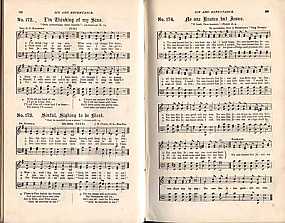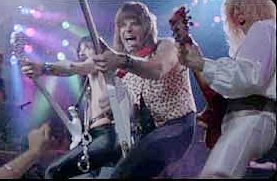Always on the lookout for God-centric music that is intelligent and beautiful, I encountered a song a few weeks back that reminded me of hymns gone by. The melody was easily sung and the lyrics that I caught on first hearing were great.
Or so I thought.
The song in question is Fernando Ortega's "Our Great God" as performed with Mac Powell off the City on a Hill—Alleluia CD. Beautiful song and very hymn-like.  The chord transitions from major to minor keys are lovely and the production on the CD is exquisite. Best of all, because the phrasing is simple and the meter consistent, it is easy to sing, unlike many of today's recent worship music offerings. And the tune is so adaptable that you could sing a thousand other old hymns to it, including "Amazing Grace."
The chord transitions from major to minor keys are lovely and the production on the CD is exquisite. Best of all, because the phrasing is simple and the meter consistent, it is easy to sing, unlike many of today's recent worship music offerings. And the tune is so adaptable that you could sing a thousand other old hymns to it, including "Amazing Grace."
Here's the first line:
Eternal God unchanging, mysterious and unknown
- God is eternal—check
- God is unchanging—check
- God is mysterious— (to the extent that His thoughts are higher than ours and His ways are sometimes hard to understand) check
- God is unknown—Uh oh
I guess no one checked with the Bible on that last one:
So Paul, standing in the midst of the Areopagus, said: "Men of Athens, I perceive that in every way you are very religious. For as I passed along and observed the objects of your worship, I found also an altar with this inscription, 'To the unknown god.' What therefore you worship as unknown, this I proclaim to you. The God who made the world and everything in it, being Lord of heaven and earth, does not live in temples made by man, nor is he served by human hands, as though he needed anything, since he himself gives to all mankind life and breath and everything. And he made from one man every nation of mankind to live on all the face of the earth, having determined allotted periods and the boundaries of their dwelling place, that they should seek God, in the hope that they might feel their way toward him and find him. Yet he is actually not far from each one of us, for "'In him we live and move and have our being'; as even some of your own poets have said, "'For we are indeed his offspring.' Being then God's offspring, we ought not to think that the divine being is like gold or silver or stone, an image formed by the art and imagination of man. The times of ignorance God overlooked, but now he commands all people everywhere to repent, because he has fixed a day on which he will judge the world in righteousness by a man whom he has appointed; and of this he has given assurance to all by raising him from the dead."
—Acts 17:22-31 ESVThe true light, which enlightens everyone, was coming into the world. He was in the world, and the world was made through him, yet the world did not know him. He came to his own, and his own people did not receive him. But to all who did receive him, who believed in his name, he gave the right to become children of God, who were born, not of blood nor of the will of the flesh nor of the will of man, but of God. And the Word became flesh and dwelt among us, and we have seen his glory, glory as of the only Son from the Father, full of grace and truth. (John bore witness about him, and cried out, "This was he of whom I said, 'He who comes after me ranks before me, because he was before me.'") And from his fullness we have all received, grace upon grace. For the law was given through Moses; grace and truth came through Jesus Christ. No one has ever seen God; the only God, who is at the Father's side, he has made him known.
—John 1:9-18 ESVBut, as it is written, "What no eye has seen, nor ear heard, nor the heart of man imagined, what God has prepared for those who love him"— these things God has revealed to us through the Spirit. For the Spirit searches everything, even the depths of God.
—1 Corinthians 2:9-10 ESVThomas said to him, "Lord, we do not know where you are going. How can we know the way?" Jesus said to him, "I am the way, and the truth, and the life. No one comes to the Father except through me. If you had known me, you would have known my Father also. From now on you do know him and have seen him." Philip said to him, "Lord, show us the Father, and it is enough for us." Jesus said to him, "Have I been with you so long, and you still do not know me, Philip? Whoever has seen me has seen the Father. How can you say, 'Show us the Father'? Do you not believe that I am in the Father and the Father is in me? The words that I say to you I do not speak on my own authority, but the Father who dwells in me does his works.
—John 14:5-10 ESV
God is NOT unknown. He has been revealed. This is one of the distinguishing marks of the Christian faith: God is knowable through the Person of Jesus Christ. What we have in this song is rank postmodernism raising its ugly head. It's that attempt to sound religious by saying God is lurking on the outskirts of the universe, inscrutably doing whatever it is an inscrutable god does.
Jesus said that God is knowable because He (Jesus) is knowable, having revealed God in His very Person. Paul clearly addresses the "unknown god" fallacy, though, saying that while some may worship unknown gods, Christians do not. John writes that Jesus Christ made God known.
Now I'm not so charged by this song. The "unknown" lyric also reveals that the intention of the "mysterious" is not so much to say that God is higher than us, but to shroud Him in fog. It sounds like a vain attempt to restore the veil in the temple.
I don't want anyone in my church singing that God is unknown, so I guess "Our Great God" is out. Too bad.
How's about it folks; what songs or hymns out there strike you as being doctrinally suspect? Your comments are most welcome!

 Nor do I ever advise anyone to base their worship “stylings” off anything that would appeal to Eddie Vedder or Lars Ulrich.
Nor do I ever advise anyone to base their worship “stylings” off anything that would appeal to Eddie Vedder or Lars Ulrich.